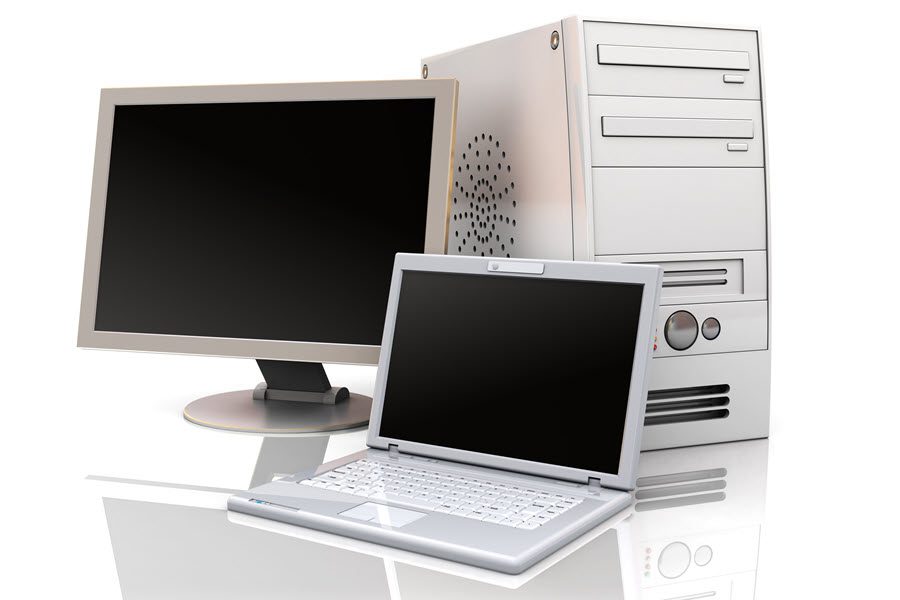The desktop vs laptop debate has been alive for a long time. With each option offering its own perks and pitfalls, it’s not necessarily as cut-and-dry to decide which one might work best for you.
The truth is that it comes down to personal circumstances and so we’ve put together a list of the pros and cons with aim of helping you decide: desktop or laptop? (Or both?)
Work/Study
Desktops
There are many aspects of the desktop computer that make it ideal for work-related purposes. One of the strongest advantages to a desktop is its power. If your job requires high-performance equipment than this may be the better choice for you. The extra space and cooling components in a desktop PC also means intensive workloads are handled much better without risk of overheating and damage to vital components. They can also utilise multiple screens and peripherals exactly as you want, setting up your workstation to suit you specifically.
Laptops
The most obvious benefit to a laptop for any work or study situation is portability. If you have any sort of commute to an office, school or university, you can’t exactly haul around a desktop and all its extra parts. Laptops can be easily popped into a bag and you can work anywhere you want.
Gaming
Desktops
The vast majority of PC gamers will undoubtedly prefer to use a desktop for their pastime of choice. They are incredibly flexible in terms of builds and peripherals and can’t be touched when it comes to performance. It is much easier to upgrade the hardware and the latest components tend to hit the desktop market first too. Desktops often have multiple spaces for storage, meaning you can install as many games as you like.
Laptops
While laptops have come a long way in terms of being viable gaming options, they still sit at a solid disadvantage to their desktop counterparts. It’s much much difficult to upgrade a laptop – especially without specialist knowledge, and overheating can be a real problem. The only real advantage that a laptop has over a desktop is, once again, its portability.
Performance/Assembly
Desktops
As mentioned above, desktops generally to tend to be a much stronger contender when it comes to performance. They pull ahead in pretty much every aspect – storage, processing power, cooling and peripheral support. The downside comes when you’re looking at assembly. Whilst you can buy desktops pre-built, the DIY nature of switching parts out can make the setup a challenge.
Laptops
Laptops can be pretty serious mobile powerhouses and are definitely becoming increasingly better as time goes on. As it stands they’re aren’t at the same level as a fully-kitted out desktop and the smaller chassis creates cooling issues that can throttle the performance.
Cost
Desktops
Desktop computers tend to offer better value for money when it comes to the quality of components. As a rule it’s generally easier to source parts and there’s often a much wider selection available. Even lower-budget, pre-built desktops can pack a punch in terms of performance, depending on your requirements.
The issue with cost can come post-purchase, as the more power-hungry components as well as monitors and speakers can all contribute to a higher energy bill that the more compact laptop.
Laptops
There are affordable laptop options to suit all lifestyles, but especially if you’re not looking for anything too high-performance. The issue comes as you look to more high-end components or features with the cost of a top-of-the-range laptop often much higher than a desktop with an almost identical specification.
You do have the benefit of software like operating systems and anti-virus generally coming pre-installed on a laptop, which along with the lower electricity demand can save you quite a hefty chunk.
Upgradeability and Repair
Desktops
We’ve already touched on it in this post, but desktops definitely have the upper hand in terms of upgrading. It is much, much easier to switch out new components, when you want a bit of extra RAM, or a new graphics card, for example. In theory a desktop is almost indefinitely upgradeable.
It’s also much simpler to troubleshoot faulty parts and get them swapped out or repaired. And if you need to see a specialist for repairs, it’s likely to be easier for them too to get replacement components ordered in as well.
Laptops
Laptops are definitely more difficult to upgrade and repair, with many having parts bespoke to specific brands and compatibility issues with generic ones. Whilst it’s not entirely impossible to, for instance, upgrade your HDD, it’s certainly more challenging. It’s more likely that you’ll need professional advice or assistance too, as laptops are complex and fiddly to work with, particularly if you’re not experienced.
When it comes to repairs for a laptop it is always worth seeking out a specialist. The hassle of trying to troubleshoot and resolve issues, even just opening the chassis can be a battle. Leave it to the folks who have the resources to do it properly.
There are pros and cons to either choice and there are strong arguments for both sides, but ultimately it’s going to come down to individual lifestyle and situation. Though there are many reasons people may be drawn to one over the other, we hope this article can provide you with some guidance in determining what might work best for your needs.


